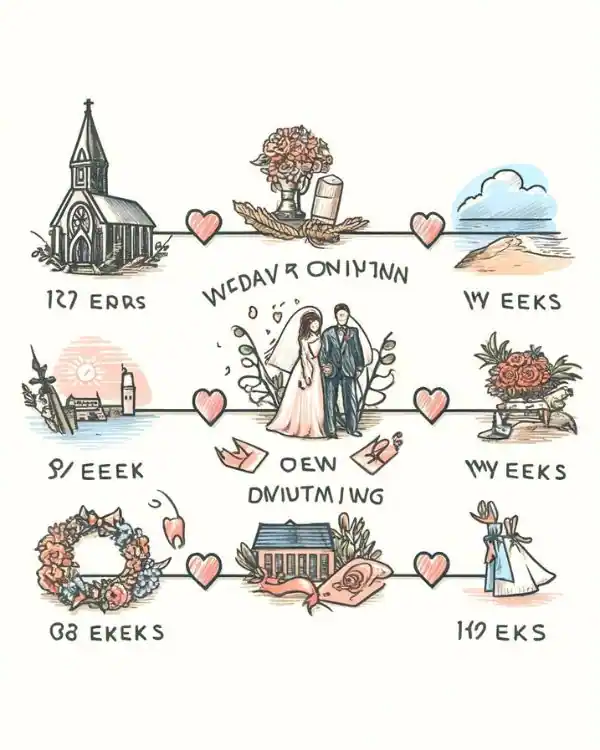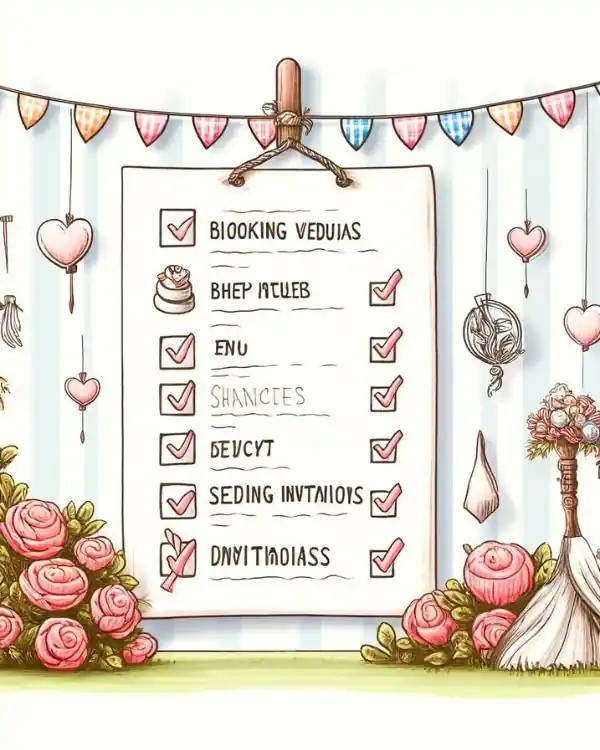Advertisement
By IS Team
Sending Wedding Invitations: How Early Is Too Early?

Advertisement
When deciding how far in advance to send wedding invitations, timing is key to ensuring a smooth and well-attended event. For local weddings, it's best to send invitations 8 to 12 weeks in advance, allowing your guests ample time to arrange their schedules.
If you're planning a destination wedding, consider sending them 12 to 16 weeks prior to accommodate travel planning. Always keep your guests' needs in mind to maximize attendance and create excitement for your big day.
Remember, the right timing invites joy and ease, making your celebration truly memorable.
Wedding Invitation Timelines
Advertisement

Navigating through the world of wedding invitations can feel like plotting a meticulous military operation. Standard practices suggest sending invitations 8 to 12 weeks before your big day. However, various factors such as holiday seasons, custom designs, and venue specifics can influence this timeline.
The Role of Wedding Location in Your Invitation Timeline
The location of your wedding significantly influences when to send out invitations. Let's look at the guidelines for domestic and destination weddings.
Domestic Wedding Considerations
For weddings within your own country, send invitations 8 to 12 weeks in advance. This allows guests ample time to arrange travel and accommodations, especially during peak seasons or for large gatherings.
Destination Wedding Specifics
For weddings abroad, it's best to send invitations 12 to 16 weeks before the wedding. The extra time helps guests manage international travel arrangements, such as booking flights and handling passport or visa requirements.
For both types of weddings, consider sending a ‘save the date’ around 6 to 9 months earlier, particularly for destination weddings, to give your guests an initial heads-up.
This thoughtful approach helps ensure that your guests can prepare adequately and increases the likelihood they can join your celebration.
Type of Wedding and Its Impact on Invitation Timing
Advertisement

The nature of your event shapes its timeline. Formal weddings often require a longer lead time due to their elaborate nature, whereas informal gatherings might afford a bit more flexibility. Similarly, the size of your wedding plays a role—larger weddings need more advanced notice to ensure everyone can make arrangements.
| Type of Wedding | Formal | Informal |
|---|---|---|
| Timing | Send invitations 10 to 12 weeks before the wedding. | Invitations can be sent 6 to 8 weeks before the wedding. |
| Reasons | Formal weddings often have elaborate elements that require early RSVPs. | Informal weddings may be more flexible and require less advance planning. |
| Additional Notes | Consider a save-the-date up to a year in advance, especially for large events. | A save-the-date is helpful but can be sent closer to the event. |
| Size of Wedding | Large Weddings (100+ guests) | Small Weddings (Fewer than 100 guests) |
|---|---|---|
| Timing | Send invitations 12 to 14 weeks in advance. | Invitations can typically be sent 8 to 10 weeks before the wedding. |
| Reasons | More guests mean more logistics and the likelihood of guests needing to travel. | Fewer guests often mean fewer logistical concerns and local travel. |
| Additional Notes | Early invitations help manage the complexities of larger guest lists. | More intimate settings generally allow for a shorter lead time. |
Advertisement
This table provides a clear guide on how the formality and size of your wedding can affect when you should send out your invitations, ensuring all guests have ample time to prepare for your big day.
Season and Timing: How Seasonal Changes Affect Your Invitations
Seasonal timing significantly influences when you should send out your wedding invitations.
Peak Wedding Seasons
During busy months like late spring through early fall, send your invitations 12 weeks in advance. This allows guests ample time to make travel and accommodation arrangements during this high-demand period.
Advertisement
Off-season Wedding Advantages
For weddings in the off-season, from late fall to early spring, you can afford to send invitations 8 to 10 weeks prior. Benefits include less competition for venues and more flexibility for your guests.
Adjusting your invitation schedule based on the season ensures better planning and increases attendance.
Guest Considerations
Advertisement

When planning your wedding invitations, consider the location of your guests. Different guests may need different amounts of notice depending on where they are coming from.
Local Guests
For guests who live nearby, sending invitations 6 to 8 weeks in advance is typically sufficient. This provides enough time for them to schedule the event into their local routines without too much lead time.
Out-of-Town Guests
Guests traveling from out of town will appreciate receiving their invitations 8 to 10 weeks before the wedding. This extra time helps them arrange travel and accommodations, especially if they need to book flights or long-distance transportation.
International Guests
For those coming from another country, consider sending invitations 12 to 14 weeks in advance. International travel requires more extensive planning, such as securing visas, flights, and possibly adjusting to time differences.
By tailoring your invitation timing to the needs of your guests, you ensure everyone has ample time to prepare and are more likely to enjoy their experience at your wedding.
Special Circumstances That Affect Timing
When sending wedding invitations, certain special circumstances can impact the timing. Here’s how to handle last-minute changes and accommodate cultural and religious considerations.
Last-Minute Changes
Unexpected situations like venue changes or date adjustments can arise. If you encounter a last-minute change, communicate it immediately to all guests. Use multiple channels like email, text, and phone calls to ensure the message reaches everyone quickly. It’s also helpful to have a point person (like a wedding planner or close family member) to field queries and provide updates.
Advertisement
Cultural and Religious Considerations
Different cultures and religions may have specific traditions that influence when and how wedding invitations are sent. For instance, some cultures have lengthy pre-wedding rituals that require invitations to be sent earlier than usual. It’s crucial to respect these traditions by planning your invitation timeline accordingly. Consulting with family members who are familiar with these practices can provide valuable guidance.
By being mindful of these special circumstances, you can adjust your plans seamlessly, ensuring that your wedding respects all traditions and handles any surprises with grace.
How Early is Too Early?
Advertisement

Timing your wedding invitations right is crucial to ensure guest attendance while maintaining their excitement.
Potential Downsides of Sending Invitations Too Early
- Loss of Interest: Invitations sent too early might lead to diminished excitement as the wedding approaches.
- Change of Plans: Guests’ schedules could change, leading to possible conflicts or forgotten commitments.
- Updates and Changes: The longer the interval between sending invitations and the wedding date, the more likely you’ll need to issue updates due to changes.
Balancing Anticipation with Ample Notice
- Ideal Timing: Typically, send invitations 8 to 12 weeks before the wedding to balance anticipation with adequate planning time.
- Save the Date: For weddings requiring travel or during busy seasons, send a save the date 6 to 9 months ahead to alert guests early without needing immediate action.
- Keep Engagement: Use reminders or updates as the date gets closer to keep guests informed and excited.
This approach helps you keep guests engaged and informed, optimizing attendance and ensuring a joyful celebration.
The RSVP Factor
RSVPs are critical for finalizing your wedding details efficiently.
Importance of RSVPs
- Accurate Headcount: Ensures proper arrangements for catering, seating, and venue capacity.
- Budget Management: Helps in fine-tuning expenses based on the actual number of attendees.
- Special Accommodations: Allows you to plan for guests' specific needs like dietary restrictions.
Recommended RSVP Return Dates
- Standard Deadline: Set the RSVP deadline 3 to 4 weeks before the wedding to finalize details with vendors and prepare seating charts.
- Adjust for Special Cases: For destination weddings or other unique circumstances, consider a longer lead time for RSVPs.
Properly managing RSVPs streamlines your planning process and enhances the overall smoothness of your event.
Checklist: Finalizing Your Wedding Invitation Timeline
Advertisement

Here's a simplified step-by-step checklist to keep your wedding invitation process on track:
12 Months Out:
- Set your wedding date and book your venue.
- Start compiling a guest list.
9 Months Out:
- Design your save-the-dates.
- Send save-the-dates, especially for destination weddings or if many guests are traveling.
6 Months Out:
- Finalize invitation design and wording.
- Order wedding invitations.
4 Months Out:
- Address and assemble wedding invitations.
- Address and assemble wedding invitations.
3 Months Out:
- Send out wedding invitations.
- Set up a system for tracking RSVPs.
1 Month Out:
- Follow up with guests who haven't responded.
- Finalize guest list and communicate final numbers to caterers and venue.
2 Weeks Out:
- Make any last-minute adjustments to seating arrangements and event details.
- Confirm details with all vendors.
1 Week Out:
- Prepare any day-of stationery (e.g., programs, place cards).
- Reconfirm arrival times and roles with wedding party and vendors.
This checklist ensures that your invitation timeline is efficiently managed and everything is set for a smooth and memorable wedding day.
Advertisement
Frequently Asked Questions
When should I send out save-the-date cards?
- Save-the-dates should typically be sent 6 to 9 months before your wedding, especially if it's a destination wedding or you have many out-of-town guests.
- Save-the-dates should typically be sent 6 to 9 months before your wedding, especially if it's a destination wedding or you have many out-of-town guests.
How far in advance should wedding invitations be sent?
- For local weddings, send invitations 8 to 12 weeks in advance. For destination weddings, consider sending them 12 to 16 weeks prior.
- For local weddings, send invitations 8 to 12 weeks in advance. For destination weddings, consider sending them 12 to 16 weeks prior.
What should I do if I need to change the wedding date or venue after sending invitations?
- Immediately inform all guests of any changes via direct communication methods like email, phone, or text, and consider updating your wedding website if you have one.
- Immediately inform all guests of any changes via direct communication methods like email, phone, or text, and consider updating your wedding website if you have one.
How do I handle non-responsive guests after the RSVP deadline?
- Reach out directly via a phone call or personal message to request a confirmation. It's important to have a final headcount for your vendors and seating arrangements.
Advertisement
I'm Looking For!








